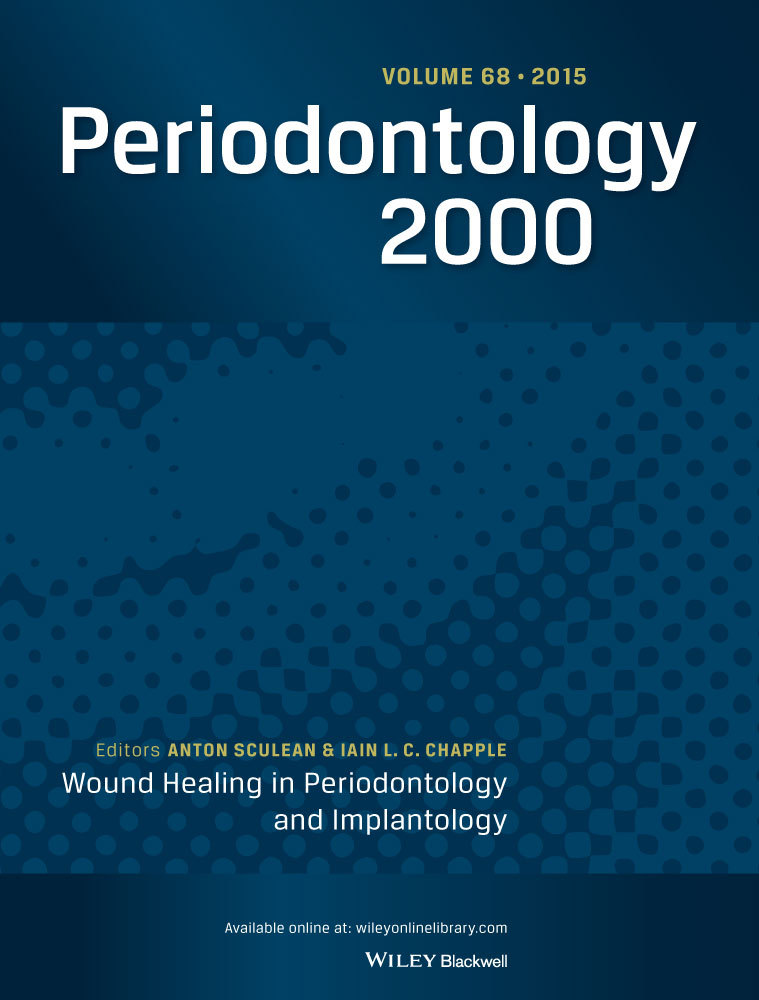L-PRF 在口腔外伤口护理中的应用
IF 15.7
1区 医学
Q1 DENTISTRY, ORAL SURGERY & MEDICINE
引用次数: 0
摘要
富含白细胞和血小板的纤维蛋白(L-PRF)是离心自体全血的副产品,含有高浓度的血小板、白细胞和纤维蛋白(后者会自发形成一个强大的三维网络(膜))。L-PRF 膜具有对伤口愈合至关重要的几个特性,包括屏障功能、抗菌和镇痛活性,以及释放生长因子,促进组织再生和新血管生成。这篇综述探讨了 L-PRF 在治疗无反应慢性伤口(如糖尿病足、静脉腿部溃疡、压疮、复杂伤口、麻风病溃疡(汉森氏病)和其他高难度伤口)中的作用。慢性伤口影响着全球数以百万计的人,对他们的生活质量、生产力和预期寿命造成了负面影响,同时也为他们自身以及私营和公共卫生系统带来了高昂的治疗费用。L-PRF 在治疗慢性皮肤伤口、缩短伤口完全闭合的时间以及改善患者报告的疗效指标(包括减轻疼痛和最大限度地减少对镇痛剂的需求)方面具有明显的辅助优势。此外,在其他要求较高的伤口中,L-PRF 也能促进伤口愈合。为了帮助临床医生,本文还提出了使用 L-PRF 治疗口外伤口的建议。本文章由计算机程序翻译,如有差异,请以英文原文为准。
L‐PRF in extra‐oral wound care
Leukocyte‐ and platelet‐rich fibrin (L‐PRF), a by‐product of centrifuged autologous whole blood, contains high concentrations of platelets, leukocytes, and fibrin (the latter spontaneously creating a strong 3‐D network (a membrane)). L‐PRF membranes possess several characteristics essential in wound healing, including a barrier function, an antibacterial and analgesic activity, and the release of growth factors enhancing tissue regeneration and neo‐vasculogenesis. This review investigated the role of L‐PRF in treating non‐responding chronic wounds such as diabetic foot, venous leg ulcers, pressure ulcers, complex wounds, leprosy ulcers (Hansen's Disease), and other demanding wounds. Chronic wounds affect millions worldwide, negatively impacting their quality of life, productivity, and life expectancy while incurring high treatment costs for themselves and private and public health systems. L‐PRF has demonstrated clear adjunctive advantages in treating chronic skin wounds, shortening the time to complete wound closure, and improving patient‐reported outcome measures (including reducing pain and minimizing the need for analgesics). Also, in other demanding wounds, L‐PRF facilitates healing. To help clinicians, this article also proposes recommendations for the use of L‐PRF in the treatment of extra‐oral wounds.
求助全文
通过发布文献求助,成功后即可免费获取论文全文。
去求助
来源期刊

Periodontology 2000
医学-牙科与口腔外科
CiteScore
34.10
自引率
2.20%
发文量
62
审稿时长
>12 weeks
期刊介绍:
Periodontology 2000 is a series of monographs designed for periodontists and general practitioners interested in periodontics. The editorial board selects significant topics and distinguished scientists and clinicians for each monograph. Serving as a valuable supplement to existing periodontal journals, three monographs are published annually, contributing specialized insights to the field.
 求助内容:
求助内容: 应助结果提醒方式:
应助结果提醒方式:


